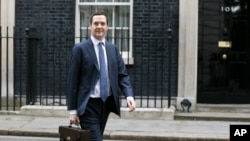Finance minister George Osborne attacked pro-Brexit campaigners for saying Britain should not just leave the European Union but also its single market, as he sought to convince voters that the economy faces big risks in next month's referendum.
Osborne said Britain would lose 200 billion pounds ($287 billion) a year in trade in 15 years' time and miss out on the same amount in foreign investment, if it fell back on World Trade Organization rules to govern its ties with the EU after a Brexit.
"Leaving the EU is a one-way ticket to a poorer Britain," Osborne told media in an aircraft hangar at Stansted Airport, northeast of London, where the head of airline Ryanair said his firm could lower investment after an "Out" vote.
Opinion polls have shown that voters tend to think that staying in the EU would be better for Britain's economy but they also remain almost evenly split between those who want to stay in the bloc and those who want to leave.
As part of a relentless series of warnings about the economic risks of Brexit, Osborne's finance ministry is due to publish a report on the short-term impact of an "Out" vote soon.
A leading supporter of the "Vote Leave" campaign, justice minister Michael Gove said earlier this month that Britain should also leave the single market after a Brexit.
If a post-Brexit Britain wanted to remain part of the single market, it would probably face demands from the rest of the bloc to keep its borders open to EU workers and to continue paying into the EU's budget, just as Norway and Switzerland do.
The "Out" campaign has put stopping high levels of immigration and Britain's contributions to the EU budget at the center of their message to voters.
Osborne spoke on Monday alongside former Labour Party economics spokesman Ed Balls, who was long a critic of Osborne, and former business minister Vince Cable, a senior member of the opposition Liberal Democrat party. Balls and Cable both said Britain risked economic damage if it left the EU.
Osborne also accused the "Out" campaign of resorting to conspiracy theories ahead of the referendum for calling into question the motives of global bodies such as the International Monetary Fund and the Organization for Economic Cooperation and Development when they spoke of the economic risks of Brexit.
"The economic argument is beyond doubt. It's not a conspiracy, it's called a consensus," Osborne said.
